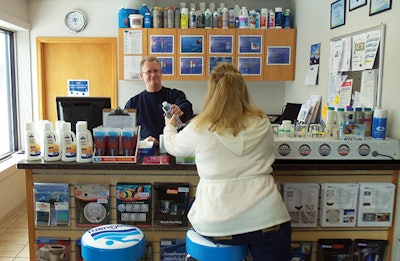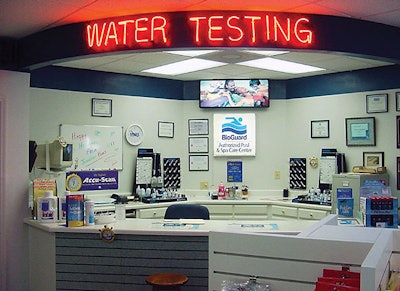
Offering free water testing for clients can spur chemical sales, but if your main intention is to make a few extra bucks, clients will see right through that, and your testing station won't be nearly as effective as it can be.
However, if your intention is to help your clients enjoy a clean, clear pool, even if that doesn't mean big sales every time clients come in to get their water tested, clients will recognize this intention, and will be back again and again.
"The way testing stations help sales is how they allow you to help customers solve and prevent their water-quality problems," says Debbie Rushin, who co-owns Cheswick Pools & Patio in Cheswick, Pa., with her husband, Justin Rushin. "By helping them enjoy their pools and facilitating the smooth operation of the pools — that's how testing stations boost sales.
"And if customers can tell you care, then when they need a new liner or something like that, they come see you."
If all is going well, clients may not need any chemicals when they come in to get their water tested, but therein lies a great opportunity to engender loyalty. "When they come in and there's nothing wrong, praise them," says Penny Johnson, co-owner of Johnson Pools & Spas in Huntsville, Ala. "Everybody likes to have a pat on the back and have other people hear, 'You take great care of your water.' Those people, you don't have to sell them anything — they're going to buy."
"There's a lot of cases where clients come in to get their water tested, and we celebrate that they've got perfect water," says Dave Thompson, president of Swimming Pool Services in Waukesha, Wis. "When we celebrate their perfect water, in a lot of cases, our cash register is not ringing, but the client is walking out happy because they have the peace of mind that their water looks good, it's safe and they're protecting their investment. When pool ownership is easy for our clients, they're going to tell their neighbors it's easy to own a pool.
"We recognize the lifetime value of a customer," Thompson continues. "We do everything: building pools, servicing pools, renovating pools. So when we build pools, I want to still be working with those clients and taking care of them in 10 to 15 years when they need a new liner. Testing their water is just one more piece of this long-term relationship."
 An organized and easy-to-find testing station facilitates a smoother process for dealers and customers. (Courtesy Johnson Pools and Spas)
An organized and easy-to-find testing station facilitates a smoother process for dealers and customers. (Courtesy Johnson Pools and Spas)
Diagnosing Discussion
Solving water-quality problems is part of this relationship, too. "When our customers bring in their water samples, there is a discussion of what's going on with their pool," says Rushin. "It's their chance to bring up any operational concerns, and we'll ask questions, too, to find out what's going on with their pool. We always ask them if their water is clear, because you can't tell everything just from testing the water."
Johnson also emphasizes the importance of communication, and in a way that really helps and builds trust. "You don't want to use lots of technical words that really have no meaning to the consumer, who just wants your help. The second thing is they don't want to see a brand-new face behind that water lab every time they walk in the door to have their water tested. They want to see a familiar face.
"And they don't just want to be another number," adds Johnson. "They want whoever is behind that water lab to listen and listen to their problems specifically. You want to ask enough questions in order to explicitly understand their circumstance. You'll want to ask: Do you run your pump 24 hours a day? What's the temperature of your pool? How many bathers do you have using your pool? Did you recently have a pool party with young children in the pool?"
These questions become so important, says Johnson, "Because, for example, if they bring in a sample of water from a pool that hasn't been circulating, you're going to get a different reading than you would have if you read it after it had been running for four or five hours. So if you sell them chemicals without knowing whether their water has been circulating, you may not be selling them the proper amount of stuff. It's up to business owners to make sure their employees know how to communicate with customers."
If a client comes in with a water-quality problem, asking about filtration is always a good idea, too. Rushin recalls a situation a few years ago where she was having difficulty clearing up a pool. "I kept telling the woman she needed to bring in her filter nest, so we could see it. She didn't do that, so I kept selling her chemicals to try to clear things up, but it wasn't working. I was getting frustrated, too. When she finally brought in her D.E. grids, they were crushed. It was like she had hardly any filter left at all because when the grids are crushed, they're not filtering right anymore."
What may have complicated matters in this particular case was that the husband and wife divided the pool duties, says Rushin. "She was responsible for bringing the sample in and trying to figure out what was going on, and he was the one that would open the filter and clean it out if necessary. Once I finally got her to bring in the grids and we found they needed to be replaced, we installed new grids and then the pool cleared up."
In addition to a conversation focused on a client's pool and the specific issues she may be dealing with, Thompson sends off customers with advice for fixing any issues. "When clients leave our store after getting their water tested, they get a recipe with step-by-step instructions for balancing their water based on the saturation index."
Thompson uses BioGuard's Accu Scan II strip reader and ALEX software. "It's all computerized, which adds a level of credibility to the process, because it take the human error our of reading the test. Plus, they know we must take it pretty seriously if we're going to invest in the hardware and software to provide the service."
Up-to-date testing technology is absolutely critical, says Johnson. "That's where the trust factor begins."
Bubbling Over
Even when you demonstrate the most sincere intention to help, some clients will buy their chemicals elsewhere, where they believe they're getting a better deal. Thompson shares a story illustrating how this backfired for one client.
"A gentleman came into our store one spring and got his water tested, and we told him he needed a bunch of alkalinity increaser," says Thompson. "It's quite common in our market in the spring to have very low alkalinity and to need up to 40 pounds of alkalinity increaser to bring the alkalinity back up and to basically buffer the pH so we can get the pH to regulate.
"When I told him he needed 32 pounds of alkalinity increaser, the gentleman said, 'Well, that's the same as Arm & Hammer.' So he went to Sam's Club and bought a bunch of what he thought was Arm & Hammer baking soda. He called me about four hours later because he had made the mistake of buying and then in putting in his pool 32 pounds of Arm & Hammer laundry detergent.
"I told him I had no experience with this situation, but that I would try to help. So we put in a couple bottles of anti-foam, and he called back the next day and said, 'It's sudsing like crazy again.' I told him then that the best route would probably be a partial drain and re-fill. So we did that, and then it got to the point where it still suds a little bit, but not real bad, and he just treated it with anti-foam for the rest of the season. It took about a year for the problem to fully go away.
"For the next few years that client sat in the front row of our annual pool school and brought up this situation to the group, saying, 'I had decided to buy something else because it was cheaper and I thought I knew better. And maybe you're smarter than me and you'll never make a mistake, but I'm pretty smart and I made the mistake.'"
The difference in the quality of products available is something Thompson brings up at these pool schools, and he also covers how to chemically treat pools. "The chemistry is probably the biggest mystery to clients, the hardest part for them to understand."
As you educate your clients, whether it's via formal pool schools or informal conversations held when they come in to get their water tested once a month, you have the opportunity to show your expertise. Thompson knows that in his area, where pools go from below freezing to 85 degrees throughout the year, if his clients only treat their pools based on reading test strips, and don't account for all the LSI parameters, they may have serious problems, particularly in the winter.
"The water temperature drops in the winter, and that changes the balance needs for the water. It tends to need more minerals, and so we bolster things because if we don't, as the temperature drops, the water will have an appetite for calcium and with that aggressiveness, you can damage interior surfaces on a pool over the winter."
It is sharing this expertise coupled with your intention to help that draws clients back time and again. When they see you care and you know your stuff, they'll be reluctant to take chances shopping at a big-box store.
Comments or thoughts on this article? Please e-mail [email protected].
Strategic SetupWith an overarching intention to help clients enjoy a crystal-clear pool, it's also wise to strategically situate your water-testing lab within your showroom and mindfully merchandise around the testing station. "It's just like milk and bread. You don't find that inside the front door of the grocery store," says Penny Johnson, co-owner of Johnson Pools & Spas in Huntsville, Ala. "There's no difference in our industry versus others when it comes to merchandising." Near your water-testing lab, says Johnson, "You want to make sure you have your test kits and reagents and the other ancillary products that consumers need to maybe test their water at home in between visits to your store. When they see test strips, for example, they may remember they need more." Displaying maintenance equipment like brushes, nets, poles and hoses around the water testing station can lead to more purchases, says Johnson. In terms of where to place your water lab within your store, Debbie Rushin, co-owner of Cheswick Pools & Patio in Cheswick, Pa., was advised to not have the lab too close to the cash register, as it can lead to overcrowding. If you have any other tips for merchandising around a water lab, please e-mail them to [email protected]. —K.E. |











































